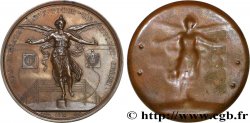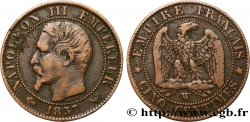E-auction 605-578749 - SECOND EMPIRE Médaille, L’archevêque Sibour
You must signin and be an approved bidder to bid, LOGIN TO BID. Accounts are subject to approval and the approval process takes place within 48 hours. Do not wait until the day a sale closes to register. Clicking on « bid » constitutes acceptance of the terms of use of cgb.fr private e-auctions.
Bids must be placed in whole Euro amounts only. The sale will start closing at the time stated on the item description; any bids received at the site after the closing time will not be executed. Transmission times may vary and bids could be rejected if you wait until the last second. For further information ckeck the E-auctions F.A.Q.
NO BUYER'S FEE.
NO BUYER'S FEE.
Type : Médaille, L’archevêque Sibour
Date: 1857
Mint name / Town : 75 - Paris
Metal : brass
Diameter : 22,50 mm
Orientation dies : 12 h.
Weight : 3,16 g.
Edge : lisse
Puncheon : sans poinçon
Coments on the condition:
Belle patine brillante. Légère usure sur deux lettres au revers, légers coups sur la tranche
Obverse
Obverse legend : M. DOM AUGUSTE SIBOUR ARCHQUE DE PARIS.
Obverse description : Buste à droit de l’archevêque tenant une crosse et pointant deux doigts .
Reverse
Reverse legend : FRAPPE MORTELLEMENT // LE / 3 JANVIER 1857 / DANS L’ÉGLISE / DE ST ETIENNE DU MONT / FÊTE PATRONALE / DE STE. GENEVIEVE / .(FLEUR). // MALEDIMUR ET BENEDICIMUS (S. PAUL AUX CORINTH. 4. 13).
Reverse description : Légende circulaire et en six lignes horizontales.
Commentary
Marie Dominique Auguste Sibour, né à Saint-Paul-Trois-Châteaux (Drôme), le 4 août 1792, mort assassiné à Paris, le 3 janvier 1857, est un ecclésiastique français, évêque du diocèse de Digne (1840-1848) puis archevêque de Paris (1848-1857).
Il est poignardé en pleine église, à l'issue d'une cérémonie le 3 janvier 1857 par Jean-Louis Verger ancien curé, visiblement déséquilibré, et déjà sanctionné par l’Église. En plus d'avoir eu plusieurs problèmes avec les autorités religieuses (avant cette affaire) qui lui ont valu une série de sanctions, M. Verger avait déjà eu maille à partir avec la justice pour plusieurs affaires de vols ou de scandales sur la voie publique. Lors d'un précédent procès un médecin avait déclaré « Il a toute sa lucidité, mais c'est un homme dangereux ». Son procès, qui se conclura par sa condamnation et son exécution le 30 janvier 1857, donnera lieu à de nouveaux esclandres de la part du prévenu..
Il est poignardé en pleine église, à l'issue d'une cérémonie le 3 janvier 1857 par Jean-Louis Verger ancien curé, visiblement déséquilibré, et déjà sanctionné par l’Église. En plus d'avoir eu plusieurs problèmes avec les autorités religieuses (avant cette affaire) qui lui ont valu une série de sanctions, M. Verger avait déjà eu maille à partir avec la justice pour plusieurs affaires de vols ou de scandales sur la voie publique. Lors d'un précédent procès un médecin avait déclaré « Il a toute sa lucidité, mais c'est un homme dangereux ». Son procès, qui se conclura par sa condamnation et son exécution le 30 janvier 1857, donnera lieu à de nouveaux esclandres de la part du prévenu..








 Report a mistake
Report a mistake Print the page
Print the page Share my selection
Share my selection Ask a question
Ask a question Consign / sell
Consign / sell
 Full data
Full data








